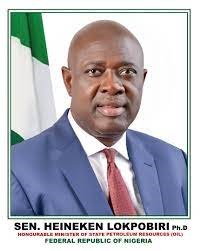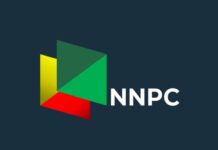. Says we can position Nigeria as a global leader in capacity development
Minister For State Petroleum Resources [Oil] and Chairman Governing Council of the Nigerian Content And Monitoring Board (NCDMB) Sen. Heineken Lokpobiri has expressed that ’The next frontier for Nigeria’s local content is focused on leveraging divestments and offshore opportunities to build capacity, enhance expertise, and increase local participation in the oil and gas industry.
According to him’ The next frontier for Nigerian Content will not be defined by policies alone but by stakeholders collective actions. Assuring that Nigeria can set a new benchmarks for local content implementation , which is capable of positioning the nation as a global leader in capacity development.
The minister made this known while speaking at the at 13th Practical Nigerian Content Forum holding in Yenagoa, Bayelsa State, with the Theme: Defining the next frontier for Nigerian Content Implementation.
Reflecting on the journey so far , the Minister noted that successes achieved in embedding local content into key sectors, particularly oil and gas, demonstrate Nigeria’s resilience, innovation, and capacity for growth. He therefore, expressed that there is more to be done as we look to the future.
He noted that over the past decade, the Nigerian Oil and Gas Industry Content Development Act (NOGICD Act) has served as a cornerstone in local capacity building. ‘’We have witnessed the growth of indigenous companies, significant job creation, and a reduction in capital flight. Through strategic initiatives by the Nigerian Content Development and Monitoring Board (NCDMB), we have achieved:, Increased Local Participation: Local content in the oil and gas sector has grown from less than 10% in 2010 to over 54% today., Technology Transfer and Training: Thousands of Nigerians have been trained to international standards, ensuring they can compete globally.
‘’On Infrastructure Development, Investments in fabrication yards, pipe mills, and engineering hubs have spurred industrialization. While these achievements are laudable, they also present us with a challenge: how do we scale these successes and replicate them across the industry?
He called on the private sector and academia to innovate boldly and collaborate with indigenous partners with research that can fuel the sector’s growth.
However, to the youth, he asked them to see the energy sector as a platform to realize their aspirations while government remain steadfast in creating policies that foster inclusivity, sustainability, and innovation.
On capacity building , he stressed that stakeholders must deepen investments in education, training, and technology to empower Nigerians with the skills required for high-value roles in the energy industry. ‘This remains a core mandate of the NCDMB, alongside institutions like the Petroleum Technology Development Fund (PTDF) and Petroleum training institute [PTI].
On the The Next Frontier Opportunities and Imperative he asked operators to reflect on the journey so far, ‘’we must also look ahead to the opportunities and challenges that lie before us:
Ongoing Onshore Divestments: With international oil companies transitioning their assets to indigenous operators, we have a golden opportunity to deepen local expertise, drive operational excellence, and build globally competitive Nigerian companies. However, we must ensure that our regulatory framework supports these transitions effectively.
On Energy Transition, he said that the global shift towards cleaner energy sources presents both a challenge and an opportunity. While Nigeria remains committed to harnessing its hydrocarbon resources, we must simultaneously explore opportunities in renewable energy and gas, which align with the global drive for sustainability.
‘’As Africa looks to integrate its energy markets, there is a compelling need for Nigeria to lead. The African Continental Free Trade Agreement (AfCFTA) offers a framework to position Nigerian enterprises at the forefront of regional trade and collaboration in the energy sector. Additionally, the African Energy Bank presents a transformative opportunity to mobilize funding for energy projects across the continent, driving sustainable growth and enhancing Nigeria’s leadership in the African energy landscape. As the host country for this transformative institution, we are positioned to unlock unprecedented opportunities for the continent.
He said that strengthening the NOGICD Act to address contemporary realities and incentivize local participation is a priority. Through Presidential Executive Orders, we are streamlining regulations to create an enabling environment for both indigenous and international players.
The Minister said Digital transformation is non-negotiable. ‘’We must integrate emerging technologies into oil and gas operations to improve efficiency and global competitiveness. I urge industry stakeholders to invest in tools and training that enhance operational excellence.
He expressed that collaboration with international and indigenous players is crucial to ensuring that Nigerian Content initiatives thrive in a dynamic global environment.
‘’The African Energy Bank is a key pillar in this endeavour, providing a robust financing mechanism to support large-scale energy projects and foster sustainable development across the continent.’’
We are glad that Nigeria won the hosting rights and we have already secured commitment from the Afreximbank of their desire to fund players who show capacity to produce more barrels per day

























